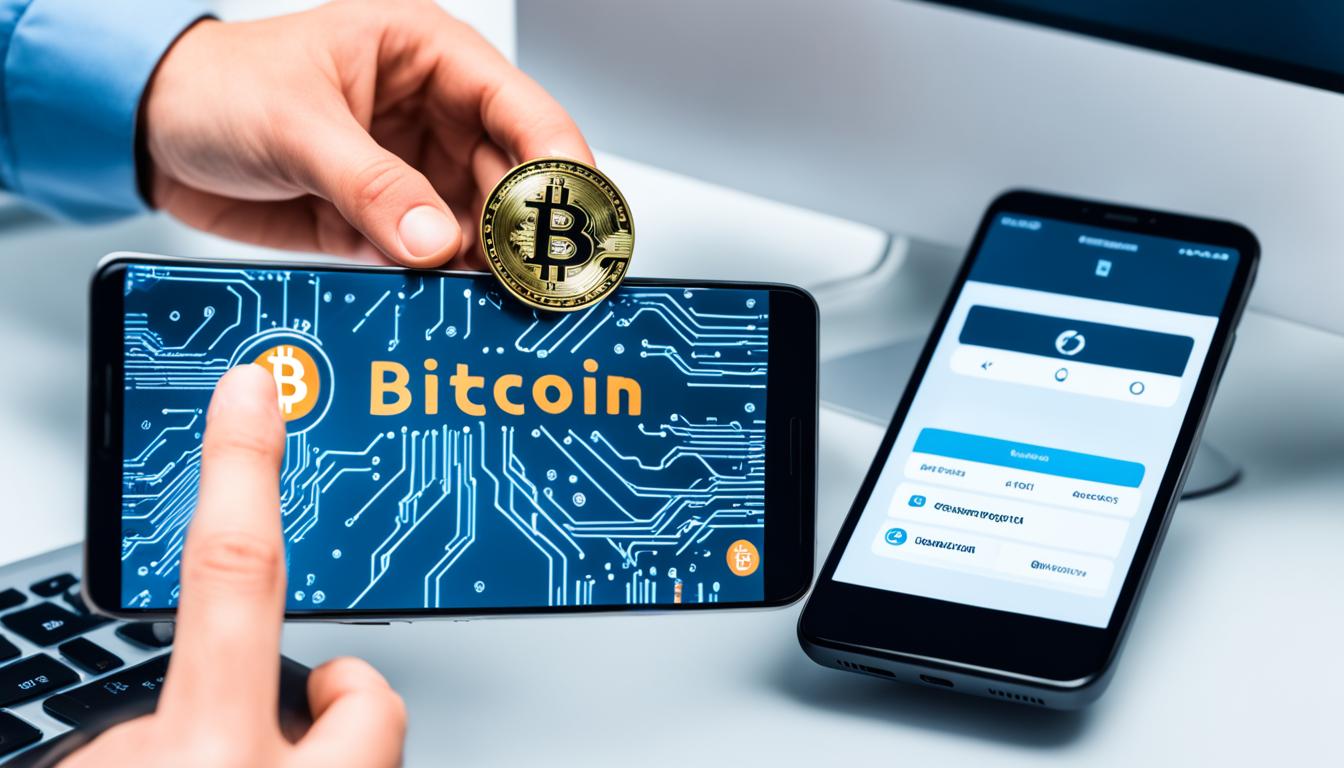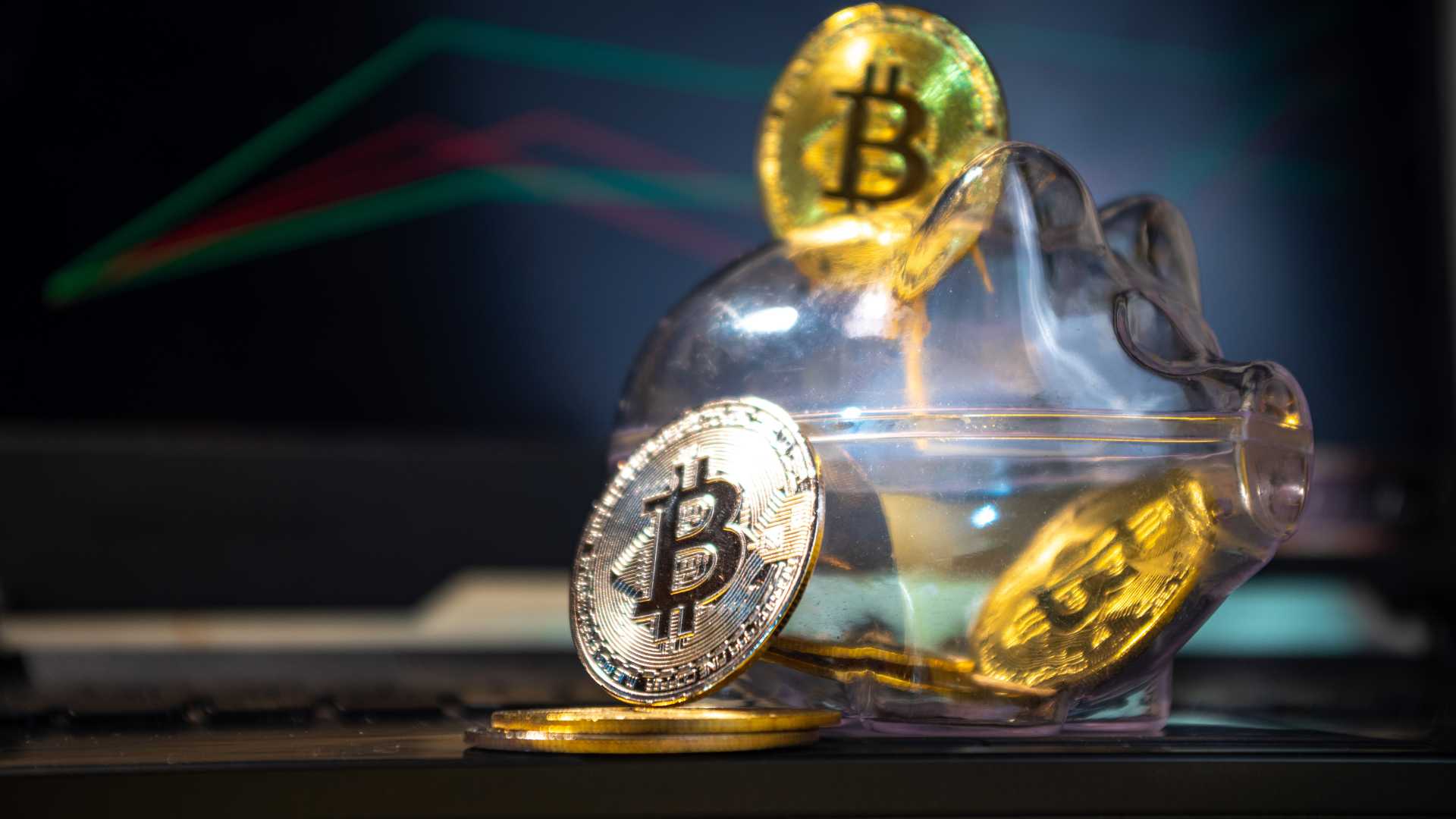Table of Contents
ToggleWelcome to our guide on how to make a Bitcoin wallet! Whether you’re new to the world of cryptocurrencies or looking to take control of your digital assets, creating your own Bitcoin wallet is a crucial step. In this section, we will walk you through the process of bitcoin wallet creation, ensuring that you have the knowledge and tools to securely manage your digital wealth.
Before we dive into the details, let’s explore why creating your own Bitcoin wallet is important. When you own a Bitcoin wallet, you have the freedom to store, send, and receive Bitcoins securely. By having your wallet, you’re no longer dependent on third-party services and exchanges, giving you complete control over your digital currency.
Creating a Bitcoin wallet may sound complex, but don’t worry – we’ve got you covered. In this guide, we’ll break down the process into simple, easy-to-follow steps. You’ll learn how to choose the right wallet for your needs, set it up securely, and manage it effectively.
Whether you’re interested in using a hardware wallet, software wallet, or an online wallet, we’ll provide you with all the information you need to make an informed decision. We’ll also discuss essential security measures to protect your Bitcoin wallet from potential threats, ensuring that your digital assets are safe.
Managing your Bitcoin wallet is equally important, and we’ll provide you with the necessary knowledge and tools to do so effectively. From software updates to backing up your wallet, we’ll cover all the essential steps to ensure your digital currency remains easily accessible and secure.
Are you ready to take control of your Bitcoin wealth? Let’s get started on the exciting journey of creating your own Bitcoin wallet.
Understanding Bitcoin Wallets
Before we dive into the process of creating a Bitcoin wallet, it’s important to first understand what a Bitcoin wallet is and the different types available. In this section, we will provide you with a comprehensive overview of Bitcoin wallets, their functionalities, and the options for wallet storage.
A Bitcoin wallet is a digital tool that allows you to store, send, and receive your Bitcoin cryptocurrency. It securely holds your private keys, which are used to authenticate transactions and access your funds. Think of it as a digital equivalent of a physical wallet, but with added security features and the ability to store digital currency.
There are several types of Bitcoin wallets, each with its own features and levels of security.
Types of Bitcoin Wallets
1. Hardware Wallets: These are physical devices that store your private keys offline. They provide strong security measures and are immune to computer viruses. Examples include the Ledger Nano S and Trezor wallets.
2. Software Wallets: These are applications that you install on your computer or mobile device. They offer flexibility and convenience, but their security depends on the device’s security measures. Popular software wallets include Electrum and Exodus.
3. Online Wallets: These wallets are hosted on the cloud, accessible through a web browser or mobile application. They are convenient for frequent transactions, but their security relies on the hosting platform. Coinbase and Blockchain.info are well-known online wallet providers.
4. Paper Wallets: These wallets involve printing your private keys on paper and securely storing them. They offer enhanced security by keeping your funds offline, but require careful handling and protection from physical damage. Websites like Bitaddress.org can generate paper wallets for you.
Each type of wallet has its pros and cons, and choosing the right one depends on your personal preferences and security preferences. Now that you have an understanding of Bitcoin wallets and their types, let’s move on to the next section to help you choose the perfect wallet for your needs.
| Wallet Type | Features | Security Level |
|---|---|---|
| Hardware Wallets | Offline storage, strong security measures | High |
| Software Wallets | Convenience, flexibility | Medium |
| Online Wallets | Easy accessibility | Medium to Low |
| Paper Wallets | Enhanced security, offline storage | High |

Understanding the different types of Bitcoin wallets and their features is crucial for making an informed decision. In the next section, we will explore how to choose the right wallet for your specific needs and preferences.
Choosing the Right Wallet for You
Now that you’ve decided to create your own Bitcoin wallet, it’s important to choose the right one that suits your needs. There are different types of wallets available in the market, each with its own set of features and benefits. Let’s explore the options and help you make an informed decision.
Types of Bitcoin Wallets
When it comes to Bitcoin wallet selection, you have several options to consider:
- Hardware wallets: These wallets are physical devices that securely store your private keys offline. They offer an extra layer of security and are ideal for long-term storage of large amounts of Bitcoin.
- Software wallets: These wallets are applications that can be installed on your computer or smartphone. They provide convenient access to your Bitcoin and are suitable for everyday use.
- Online wallets: Also known as web wallets, these wallets operate in the cloud and can be accessed from any device with an internet connection. They offer easy accessibility but may be more vulnerable to security risks.
- Paper wallets: Paper wallets involve printing your private keys on a physical piece of paper. They provide a cold storage solution and are considered one of the most secure options.
Each type of wallet has its own advantages and disadvantages, so it’s essential to weigh your priorities and assess the level of security and convenience you require.
Factors to Consider
When choosing the best Bitcoin wallet for you, consider the following factors:
- Security: Prioritize wallets that offer robust security features, such as two-factor authentication and encryption.
- Convenience: Decide whether you prefer having quick access to your Bitcoin on the go or if you’re comfortable with offline storage options.
- Usability: Look for wallets with user-friendly interfaces and intuitive features that make managing your Bitcoin hassle-free.
- Compatibility: Ensure the wallet you choose is compatible with your device and operating system.
Compare Wallets
To help you make an informed decision, here’s a comparison table of popular Bitcoin wallets:
| Wallet Type | Security | Convenience | Usability | Compatibility |
|---|---|---|---|---|
| Hardware Wallet | High | Medium | High | Desktop and Mobile |
| Software Wallet | Medium | High | High | Desktop and Mobile |
| Online Wallet | Low | High | Medium | Desktop and Mobile |
| Paper Wallet | High | Low | Low | None |
Remember, finding the best Bitcoin wallet is a personal decision based on your unique requirements. Take the time to evaluate the available options and choose a wallet that aligns with your priorities, providing a balance between security and convenience.
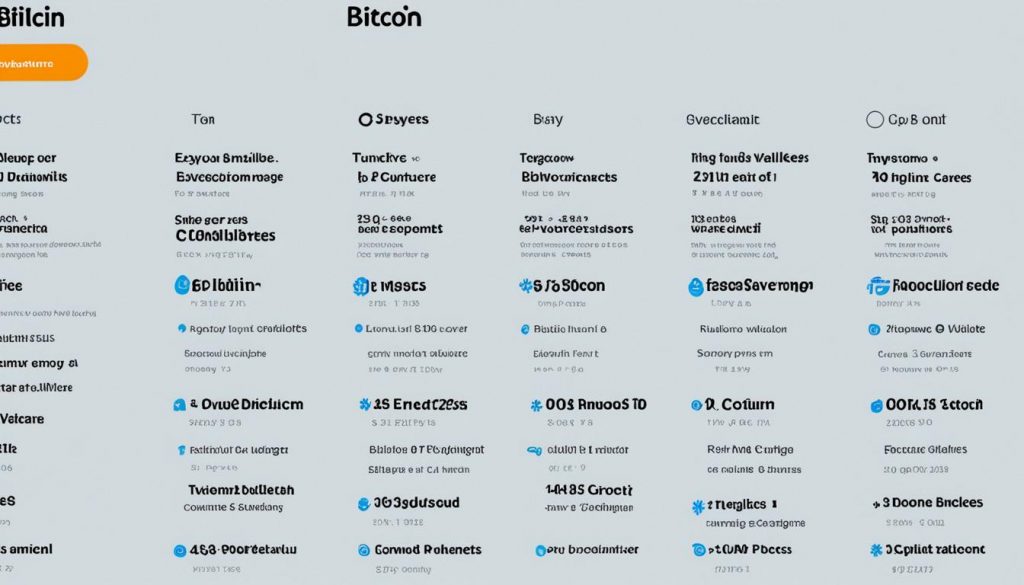
Setting Up Your Bitcoin Wallet
Now that you’ve chosen your Bitcoin wallet, it’s time to set it up. Follow our step-by-step guide below to easily set up your wallet and start managing your digital assets securely.
Create a Secure Password
Creating a strong and secure password is crucial to protecting your Bitcoin wallet from unauthorized access. Ensure your password includes a combination of uppercase and lowercase letters, numbers, and special characters. Avoid using easily guessable information like your name or date of birth. Consider using a password manager to generate and store complex passwords securely.
Generate Your Wallet Address
Once you have set up your wallet, you will need to generate a wallet address. This address serves as your unique identifier for receiving Bitcoin. It is usually a combination of letters and numbers. To generate your wallet address, navigate to the appropriate section in your wallet’s interface and follow the instructions provided.
Add Additional Security Measures
To enhance the security of your Bitcoin wallet, consider implementing additional security measures such as:
- Two-factor authentication (2FA): Enable 2FA to add an extra layer of security. This requires you to provide a second authentication factor, such as a verification code sent to your mobile device.
- Multi-signature (multi-sig) wallets: Opt for a multi-sig wallet that requires multiple signatures to authorize transactions. This reduces the risk of unauthorized transactions.
- Hardware wallets: Consider using a hardware wallet, which stores your private keys offline on a physical device. This provides an additional layer of protection against online threats.
Implementing these measures will significantly increase the security of your Bitcoin wallet and protect your digital assets from potential breaches.
Your Step-by-Step Bitcoin Wallet Setup:
| Step | Description |
|---|---|
| 1 | Choose a reputable Bitcoin wallet provider that meets your needs and preferences. |
| 2 | Download and install the wallet software or app from the official website or trusted app store. |
| 3 | Create a secure password using a combination of uppercase and lowercase letters, numbers, and special characters. |
| 4 | Follow the wallet provider’s instructions to generate your unique wallet address. |
| 5 | Enable additional security measures such as two-factor authentication (2FA) or multi-signature (multi-sig) wallets. |
| 6 | Back up your wallet’s recovery phrase or seed in a secure location. This will allow you to restore your wallet in case of loss or device failure. |
By following these steps, you can confidently set up your Bitcoin wallet and protect your digital assets against potential threats.
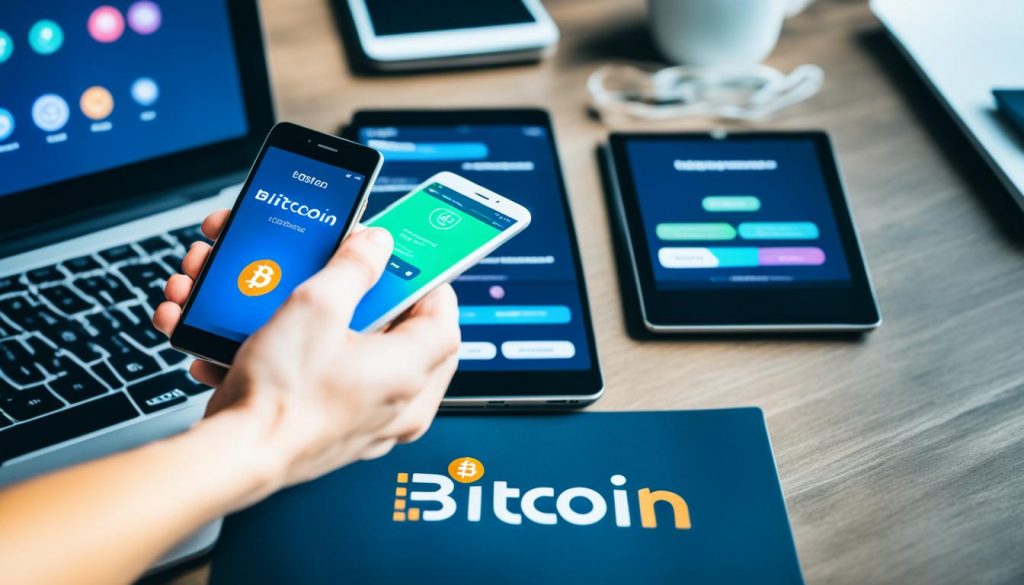
Securing Your Bitcoin Wallet
Security is paramount when it comes to Bitcoin wallets. As the value of Bitcoin increases, so do the risks associated with owning it. It is essential to take proactive steps to secure your Bitcoin wallet and protect your digital assets. In this section, we will guide you through essential security measures to safeguard your wallet from potential threats. By implementing these best practices, you can have peace of mind knowing that your Bitcoin is safe and secure.
Two-Factor Authentication
One of the most effective ways to enhance the security of your Bitcoin wallet is by enabling two-factor authentication (2FA). 2FA adds an additional layer of security and ensures that only you can access your account, even if your password gets compromised. When enabled, you will need to provide a second form of authentication, such as a unique code generated on your mobile device, in addition to your password. This significantly reduces the risk of unauthorized access to your wallet.
Choose a Strong and Unique Password
Your wallet’s password is the first line of defense against unauthorized access. It is crucial to choose a strong and unique password that is difficult for others to guess. Avoid using common phrases or personal information that can be easily associated with you. Instead, create a password that combines uppercase and lowercase letters, numbers, and special characters. Additionally, it is essential to never reuse passwords for multiple accounts. Using a password manager can help you generate and securely store complex passwords.
Enable Wallet Encryption
Encrypting your Bitcoin wallet adds an extra layer of protection by securing your private keys. Private keys are essential for accessing and managing your Bitcoin funds. By enabling wallet encryption, you ensure that even if someone gains unauthorized access to your wallet file, they won’t be able to retrieve your private keys without the encryption passphrase. This feature is typically available in most Bitcoin wallet software and is a crucial step in securing your wallet.
Regularly Update Your Wallet Software
Bitcoin wallet software is regularly updated to address any security vulnerabilities that may arise. It is crucial to keep your wallet software up to date by installing the latest updates and patches. These updates often include security enhancements and bug fixes, ensuring that your wallet is protected against the latest threats. Regularly checking for updates and promptly installing them is an essential step in maintaining the security of your Bitcoin wallet.
Backup Your Wallet Regularly
Backing up your Bitcoin wallet is essential in case of hardware failure, theft, or loss. By regularly creating backups, you can easily restore your wallet and regain access to your funds. When creating a backup, it is crucial to securely store it in multiple locations, such as offline storage devices or encrypted cloud storage. This ensures that even if one backup is lost or compromised, you have a copy stored elsewhere to recover your wallet.
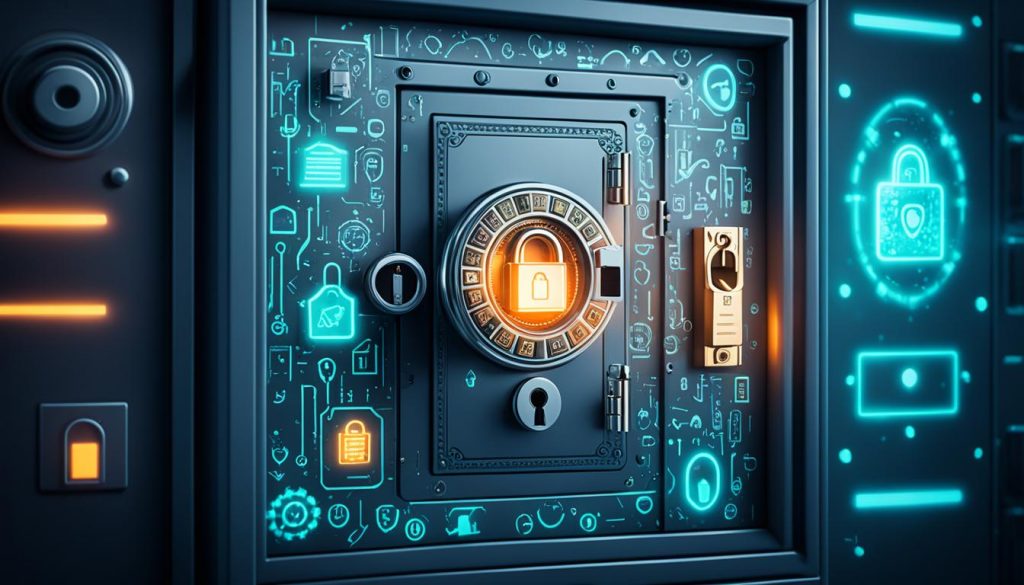
| Security Measure | Description |
|---|---|
| Two-Factor Authentication (2FA) | Enables an additional layer of authentication for accessing your wallet by requiring a unique code generated on your mobile device. |
| Strong and Unique Password | Create a password that combines uppercase and lowercase letters, numbers, and special characters, avoiding common phrases or personal information. |
| Wallet Encryption | Protects your private keys by encrypting your wallet file, ensuring that even if your wallet gets compromised, your private keys remain secure. |
| Regular Updates | Keep your wallet software up to date by installing the latest updates and patches to address any security vulnerabilities. |
| Regular Backup | Create backups of your wallet regularly and store them securely in multiple locations to guard against data loss or theft. |
Managing Your Bitcoin Wallet
Once your Bitcoin wallet is set up and secure, it’s important to know how to manage and maintain it effectively. Proper management ensures the smooth functioning of your wallet and allows you to stay updated with your digital currency transactions. In this section, we will explore key aspects of managing your Bitcoin wallet, including software updates, wallet backup, and transaction tracking.
Updating Your Wallet Software
Regularly updating your wallet software is crucial for maintaining the security and functionality of your Bitcoin wallet. Wallet developers frequently release software updates to address vulnerabilities and add new features. By keeping your wallet software up to date, you ensure that you have the latest security patches and improvements. Check your wallet provider’s website or the app store for updates, and follow their instructions to install the latest version of the software.
Backing Up Your Wallet
Backing up your Bitcoin wallet is a vital step in ensuring the safety of your digital assets. Accidental damage, theft, or device failure can result in the loss of your wallet and funds. By creating regular backups, you can easily restore your wallet in such situations. Most Bitcoin wallets provide options for creating a backup, which typically involves generating a backup phrase or file. Follow your wallet provider’s instructions to create and securely store your wallet backup in a separate location, preferably offline or on encrypted storage devices.
Keeping Track of Your Transactions
Tracking your Bitcoin transactions allows you to monitor your financial activity and verify the accuracy of incoming and outgoing payments. Your Bitcoin wallet should have a transaction history feature that provides details such as transaction amounts, dates, and recipient addresses. By reviewing your transaction history regularly, you can identify any unusual or unauthorized transactions and take appropriate actions to protect your funds. Additionally, keeping track of your transactions helps you maintain accurate records for tax purposes or other financial reporting.
By effectively managing your Bitcoin wallet, including regular software updates, backups, and transaction tracking, you can ensure the security and seamless functionality of your digital currency storage. Don’t neglect these essential maintenance tasks, as they play a crucial role in safeguarding your Bitcoin wealth.
Staying Informed About Bitcoin Wallets
The world of Bitcoin wallets is constantly evolving, and staying updated with the latest news and advancements is essential. To help you stay informed, we have gathered valuable resources that provide the latest updates and news on Bitcoin wallets.
Bitcoin Wallet News Websites
Stay up-to-date with the latest news about Bitcoin wallets on these reputable websites:
- CoinDesk
- Cointelegraph
- Bitcoin.com
Bitcoin Wallet Blogs
Follow these popular blogs to get insights, tips, and updates on Bitcoin wallets:
- Blockchain.com Blog
- Trezor Blog
- Ledger Blog
Bitcoin Wallet Social Media
Join the conversation and stay connected with the Bitcoin wallet community through social media channels:
By regularly checking these resources, you’ll be able to keep track of the latest updates, security alerts, and new features in the world of Bitcoin wallets.
| Website | Description |
|---|---|
| CoinDesk | A leading source for Bitcoin news, analysis, and market insights. |
| Cointelegraph | Covers breaking news, features, and opinions on Bitcoin and cryptocurrencies. |
| Bitcoin.com | Provides news, guides, and tools for Bitcoin users and enthusiasts. |
| Blockchain.com Blog | Offers insights, tutorials, and updates on Blockchain.com wallets and services. |
| Trezor Blog | Official blog of the Trezor hardware wallet, featuring news and educational content. |
| Ledger Blog | Provides articles on Ledger hardware wallets, security, and cryptocurrency management. |
Take advantage of these resources to enrich your knowledge and stay informed about the latest developments in the world of Bitcoin wallets.
Conclusion
In conclusion, creating and managing your own Bitcoin wallet doesn’t have to be overwhelming. By following our step-by-step guide and implementing the necessary security measures, you can confidently secure and control your digital currency. Get started today and take control of your Bitcoin wealth.
FAQ
How do I create a Bitcoin wallet?
To create a Bitcoin wallet, follow these steps:
1. Choose a wallet provider or software that suits your needs.
2. Visit the website or download the wallet software.
3. Click on the “Create New Wallet” option.
4. Set a strong password for your wallet.
5. Follow the prompts to generate your wallet address.
6. Make sure to write down or securely store your wallet’s recovery phrase.
7. Complete the setup process, and you’re ready to use your new Bitcoin wallet!
What is a Bitcoin wallet, and why do I need one?
A Bitcoin wallet is a digital wallet that allows you to securely store, send, and receive Bitcoin. It consists of two keys – a public key that others can use to send Bitcoin to your wallet and a private key that you should keep secret to access and manage your funds. You need a Bitcoin wallet to store your Bitcoin securely and have full control over your digital assets.
How do I choose the right Bitcoin wallet for me?
Choosing the right Bitcoin wallet depends on your preferences and needs. Consider factors such as security features, ease of use, compatibility with your device, and whether you prefer a hardware, software, online, or paper wallet. Research different wallet options and read user reviews to make an informed decision.
How can I secure my Bitcoin wallet?
To secure your Bitcoin wallet, follow these tips:
1. Use a strong password and consider enabling two-factor authentication.
2. Keep your wallet software and device up to date with the latest security patches.
3. Store your backup phrase or recovery seed securely offline.
4. Be cautious of phishing attempts and only download wallet software from trusted sources.
5. Consider utilizing hardware wallets for added security.
How do I manage my Bitcoin wallet?
Managing your Bitcoin wallet involves tasks such as updating your wallet software regularly, backing up your wallet, and keeping track of your transactions. Make sure to follow the wallet provider’s instructions for updating and backing up your wallet, and use blockchain explorers to monitor your transactions.
Where can I find the latest news and updates about Bitcoin wallets?
Stay informed about the latest news and updates on Bitcoin wallets by regularly visiting reputable cryptocurrency news websites, joining online forums or communities dedicated to Bitcoin, and following wallet providers on their official social media channels. These sources will keep you up to date with the latest developments and security announcements.




